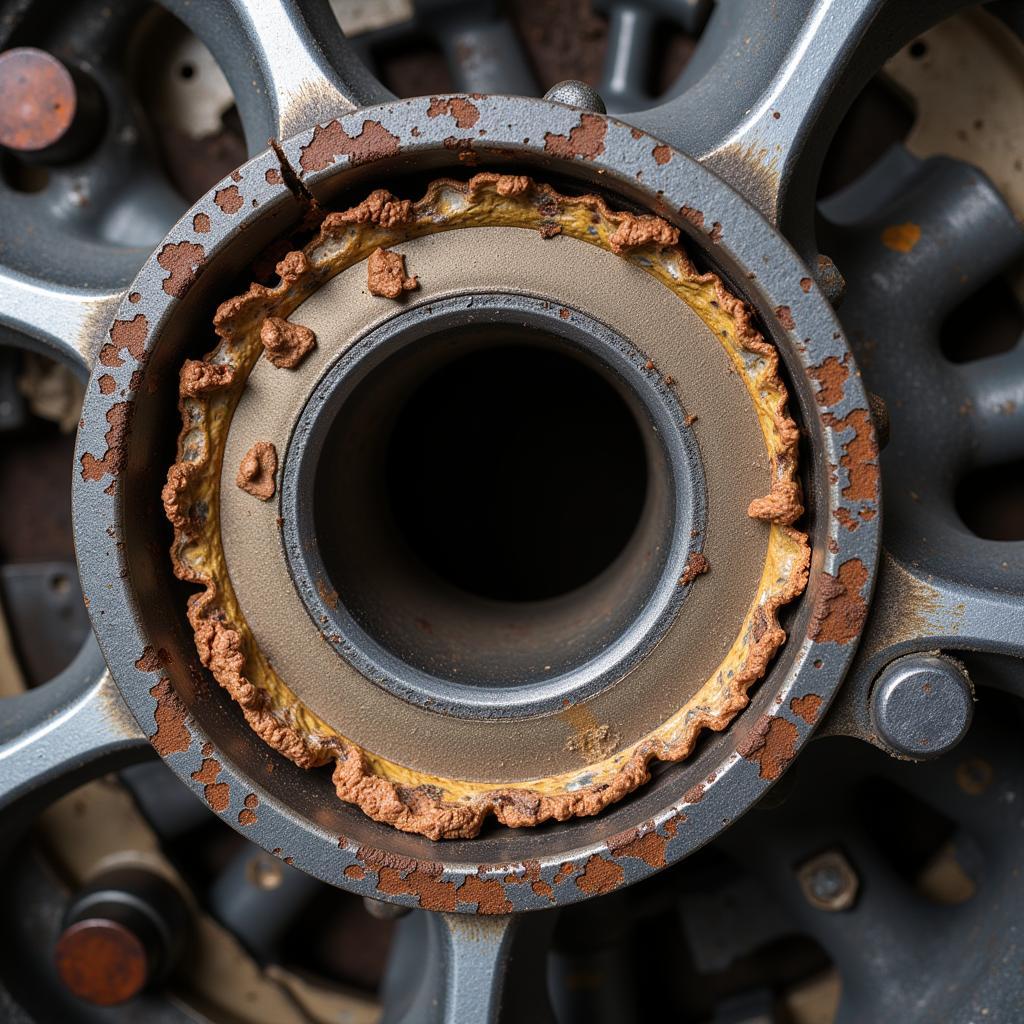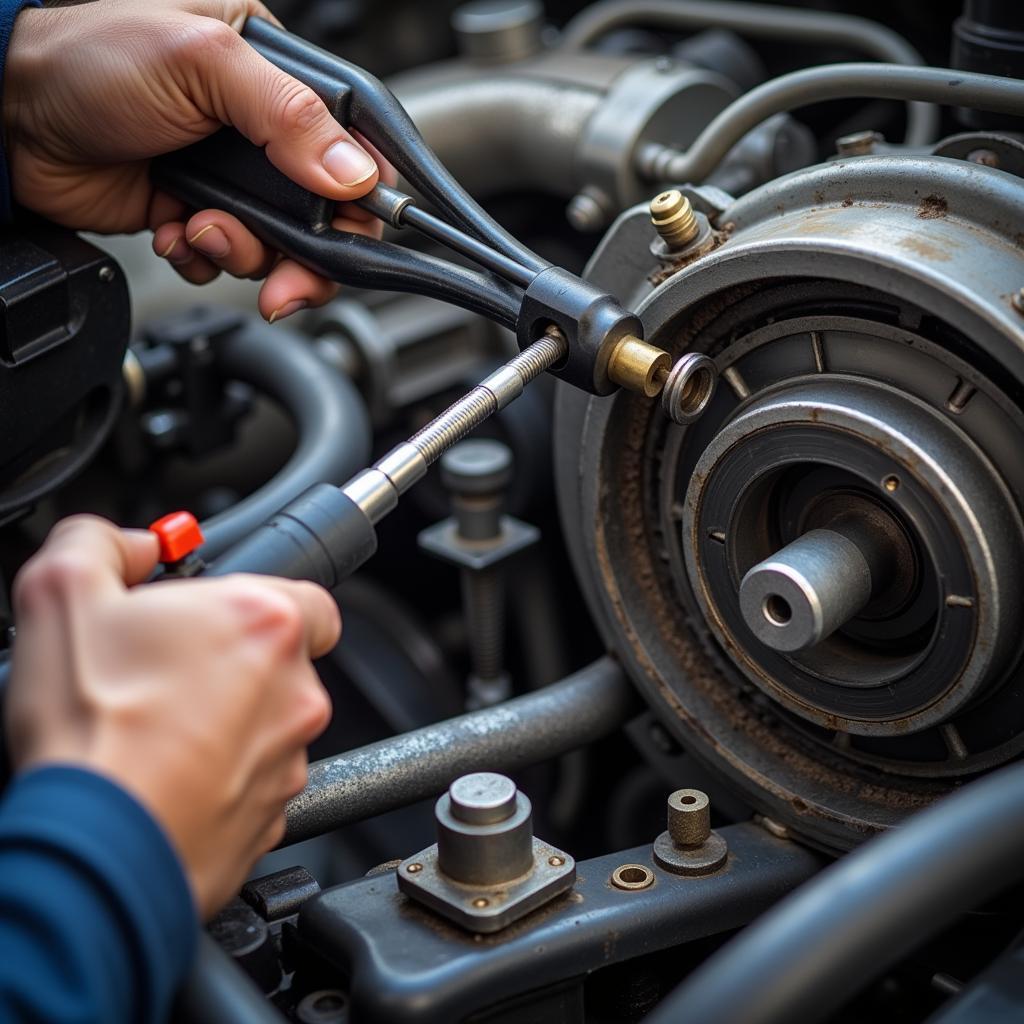Car Engine Bearing Problems can be a significant headache for any car owner. From subtle knocks to catastrophic engine failure, understanding the causes, symptoms, and solutions is crucial for maintaining your vehicle’s health and longevity. This guide delves into the complexities of engine bearing issues, providing you with the knowledge to diagnose, address, and prevent these potentially costly problems.
Similar to wheel bearing problems car, engine bearing issues can manifest in various ways. Engine bearings are crucial components that allow the crankshaft and connecting rods to rotate smoothly within the engine block. These bearings endure immense pressure and friction, making them susceptible to wear and tear over time. Ignoring these issues can lead to severe engine damage, requiring extensive and expensive repairs.
Understanding the Role of Engine Bearings
Engine bearings are thin metal shells coated with a soft, low-friction material. They provide a smooth surface for the crankshaft and connecting rods to rotate against, minimizing friction and wear. These bearings also help distribute the forces generated by the combustion process, ensuring the engine operates efficiently. There are two main types of engine bearings: main bearings, which support the crankshaft, and connecting rod bearings, which connect the pistons to the crankshaft.
What happens when engine bearings fail? Bearing failure can range from slight wear to complete disintegration. This can result in a variety of problems, including reduced engine performance, increased oil consumption, and ultimately, engine seizure.
 Worn engine bearing showing signs of damage and wear
Worn engine bearing showing signs of damage and wear
Common Causes of Car Engine Bearing Problems
Several factors can contribute to car engine bearing problems. Lack of lubrication is a primary culprit. Insufficient oil levels or contaminated oil can starve the bearings of the necessary lubrication, leading to excessive friction and wear. Overheating can also damage bearings, causing the bearing material to soften and break down. Excessive loads on the engine, such as towing heavy trailers or aggressive driving, can also put undue stress on the bearings, accelerating wear.
How can I tell if my engine bearings are bad? Several symptoms can indicate potential bearing problems. These include unusual noises coming from the engine, such as knocking or rumbling sounds, low oil pressure, and excessive oil consumption.
Diagnosing Car Engine Bearing Problems
Diagnosing engine bearing problems requires careful observation and analysis. Listening for unusual engine noises is often the first step. A knocking or tapping sound, especially when the engine is under load, can indicate a worn bearing. Checking the oil pressure gauge is another important diagnostic step. Low oil pressure can be a sign of bearing wear, as damaged bearings can allow oil to leak past them. Finally, a visual inspection of the engine components can reveal further clues, such as metal shavings in the oil or signs of overheating.
 Mechanic inspecting engine bearings for damage
Mechanic inspecting engine bearings for damage
What are the consequences of ignoring bad engine bearings? Ignoring bad engine bearings can lead to severe engine damage, potentially requiring a complete engine rebuild or replacement.
Solutions and Repair Options
Depending on the severity of the damage, several repair options are available for car engine bearing problems. In some cases, simply replacing the worn bearings may be sufficient. However, if the damage is extensive, more significant repairs, such as crankshaft grinding or engine rebuilding, may be necessary. It’s essential to consult with a qualified mechanic to determine the best course of action. Regular oil changes and proper engine maintenance can help prevent many bearing problems in the first place.
Is it expensive to fix engine bearing problems? The cost of repairing engine bearing problems can vary significantly depending on the extent of the damage and the specific vehicle.
Preventing Future Bearing Issues
Preventing car engine bearing problems involves proactive maintenance and responsible driving habits. Regular oil changes with the correct oil viscosity are crucial for maintaining proper lubrication. Avoiding excessive engine loads and monitoring engine temperature can also help prevent bearing wear. Addressing any unusual engine noises promptly can prevent minor issues from escalating into major problems. Similar to diagnosing a diagnose car water pump problem, addressing engine bearing issues quickly is key to preventing more serious problems.
As John Smith, a seasoned automotive engineer with over 20 years of experience, often says, “Regular maintenance is the key to a long and healthy engine life. A simple oil change can save you thousands of dollars in repairs down the road.” He further emphasizes the importance of using quality oil, stating, “Using the right oil for your engine is just as important as changing it regularly. The wrong viscosity can lead to premature wear and tear on vital components like bearings.”
Conclusion
Car engine bearing problems can be a significant concern, but with proper understanding and preventative measures, you can keep your engine running smoothly for years to come. Recognizing the symptoms and addressing them promptly is crucial to avoid costly repairs. Regular maintenance, including oil changes and monitoring engine temperature, are your best defenses against bearing failure. Don’t hesitate to connect with us at AutoTipPro for expert advice and support. You can reach us at +1 (641) 206-8880 or visit our office at 500 N St Mary’s St, San Antonio, TX 78205, United States.
Just like understanding a 1995 celica clutch problems after car warms up requires specialized knowledge, so does dealing with engine bearing issues. Consulting with a professional is always recommended.
For optimizing your car’s performance, you can also explore car distance optimzation problem. Another useful tool for troubleshooting car problems is a magnetic microphone for troubleshooting car problems.
FAQ
-
What is the most common cause of engine bearing failure? Lack of lubrication is the most common cause.
-
How often should I change my engine oil? Consult your owner’s manual for the recommended oil change interval, typically every 3,000-5,000 miles.
-
Can I drive with a bad engine bearing? It is not recommended to drive with a bad engine bearing, as it can cause further damage.
-
What does a bad engine bearing sound like? A bad engine bearing often produces a knocking or rumbling sound.
-
How much does it cost to replace engine bearings? The cost varies depending on the vehicle and the extent of the damage.
-
Can engine bearings be repaired? In some cases, bearings can be replaced, but severe damage may require more extensive repairs.
-
How can I prevent engine bearing problems? Regular oil changes and avoiding excessive engine loads are key to prevention.






Leave a Reply